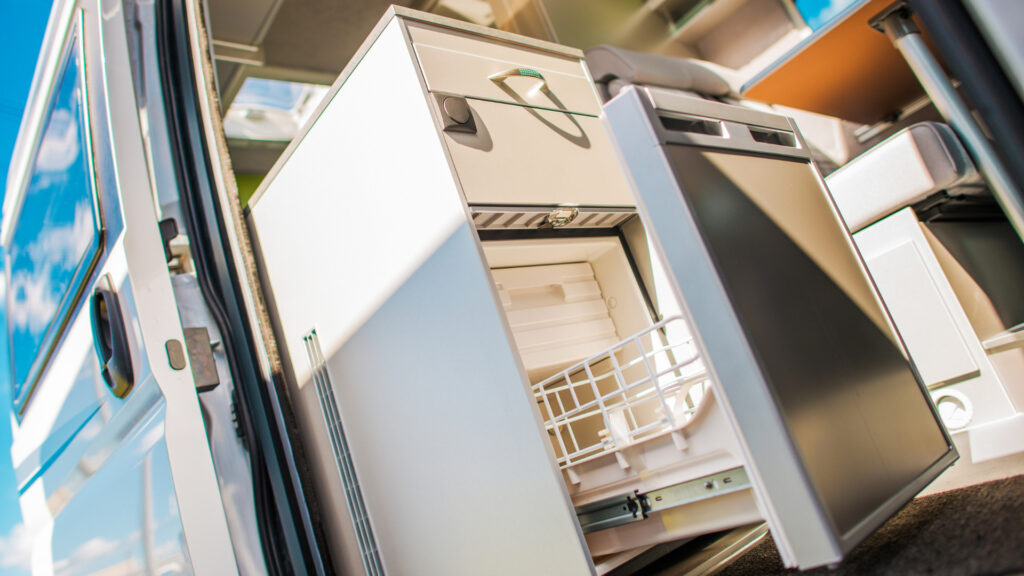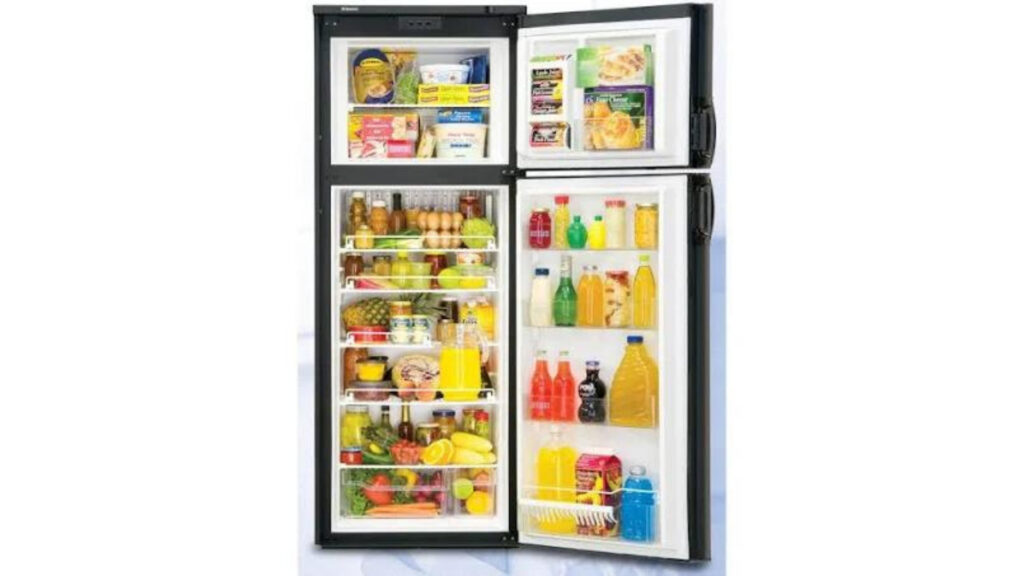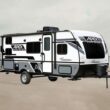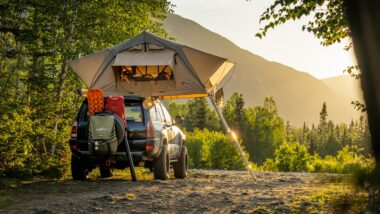Table of Contents Show
Having an RV fridge is nice to have while traveling. The ability to store perishable foods while remaining mobile is pretty amazing.
But getting the best fridge for your RV is a matter of research. You must first understand some basics to make the best decision for refrigeration. Start now, and check out this brief information compilation to help you choose the best RV fridge for your travel adventures.
What Is an RV Fridge?
Choosing a refrigerator for your RV isn’t like choosing one for your residential home. There are several types of fridge setups, and what you need from your fridge will weigh heavily on the kind of RV fridge you should purchase.
Most importantly, you should know the difference between an RV fridge and a residential fridge. RV refrigerators are smaller than a typical residential refrigerator, and they usually run a little differently. Typically, an RV fridge is an absorption refrigerator that can run on either propane or DC power.
It often has unique features like latching doors and sturdier construction. As you keep reading, you’ll learn more about the various types of RV fridges on the market.

What Is the Difference Between a 2-Way And 3-Way Refrigerator?
When someone talks about a 2-way RV fridge, they’re referring to an absorption refrigerator that can be powered by LP gas or AC power.
LP gases refer to propane or butane. AC (alternating current) power typically comes from the RV house batteries. Having the ability to run from two different power sources offers flexibility to travelers.
A 3-way fridge can run on LP gas, AC power, or DC (direct current) power. Running on direct current power means that your fridge can swap power sources and run when you’re plugged into shore power or a generator.
Can You Put a Regular Fridge in an RV?
You could install a regular or “residential-style” fridge in larger towables and class A RVs, but there are certain stipulations to consider before going this route.
Regular fridges cool faster, but a regular fridge in your RV can only run on shore power unless you have a massive generator. This means you won’t have cooling power unless you’re parked and plugged in.
They’re also heavier and take up more space, making them impractical for most RVs.

Things to Consider Before Buying an RV Fridge
Consider how you’ll use the fridge before making your final decision on an RV fridge. The different kinds of fridges on the market vary to serve a broader list of needs.
Capacity
Size definitely matters when considering which fridge will best suit your RVing needs. If you’re traveling alone or with just one other person, you likely don’t need a huge fridge in your vehicle. If you regularly travel with the whole family, you may need a larger capacity refrigerator.
Power Source
Consider how you’ll power your fridge. If you stay parked often and have a large RV, you might consider a “residential-style” fridge in your vehicle. If you’re constantly on the go, a 3-way or 2-way fridge will give you more flexibility.
Features
Ergonomic locking doors, wide crisper drawers, or a steel frame for durability on the bumpiest routes can all be important when you’re choosing the right RV fridge for your next road trip. An automatic shut-off feature for fridges that run on LP gas is also important. Make sure you understand what the fridge includes before committing to a purchase.
Size
You should consider the amount of food your fridge can hold, but the exterior dimensions of the fridge are most important. Can the fridge fit into the space allotted inside your RV? Is it too heavy for your rig?
Get clear measurements, so you don’t have to worry about nestling the thing once it arrives.
The Best RV Fridges
Best is clearly relative to need, but there are some RV fridges that have been tried and proven true by consumers. Take a quick peek at these four suggestions before making your final purchase.
Norcold N10DCSSR Polar-Series
- Reversible taller stainless steel doors with curved edges provide a built-in look
- Travel latch keeps the doors closed during transit
The Norcold Polar-Series RV fridge is a compressor-type fridge with 10 cubic feet of storage space for your yummiest foods. It has an LCD control panel with an eye-level display and controls for convenient monitoring and cooling control.
The Norcold runs on 12V DC power and on 5 amps. It has three shelves and two bins for organizing your perishables. It’ll cost you around $1,300 to purchase.
RecPro RV Refrigerator Stainless Steel
- Versatile Sizes: Choose from 1.7 cubic feet, 3.3 cubic feet, 4.4 cubic feet or 10 cubic feet options to suit your RV...
- Frost-Free Design: Say goodbye to manual defrosting with our advanced frost-free technology, ensuring hassle-free...
This is a stainless steel compressor fridge with a top freezer and more than 10 cubic feet of storage inside. It weighs just under 120 lbs, and it’s a frost-free model. You won’t have as much maintenance and fuss when it comes to keeping this fridge in good working order.
The dimensions of this model fridge are 23.5” wide, 24.75” deep, and 59.63” high. Expect to pay around $1,400 for this beauty.
SMETA Propane Refrigerator
- Propane Refrigerator with Freezer 6.1 Cu.ft: Two compartments, one is a gas fridge (4.5 cu ft), and another is a propane...
- 110V/LPG Power Connection: This RV fridge dual power could be powered by 110V or propane gas, which is also suitable for...
As you may have gathered from the name of the fridge, this SMETA fridge runs on propane power. It’s an absorption fridge, which means it works a little differently than a traditional refrigerator.
It’s a 2-way fridge, meaning you can run it on propane or AC power. You’ll have to budget close to $1,600 for this particular fridge, but it’ll grant you flexibility with your power sourcing.
Dometic RM3762RB

The Dometic is a smaller model at only seven cubic feet of storage, but it doesn’t lack in function. You’ll get an eye-level, LED temp display that’s adjustable, along with self-locking doors. These elements are pretty standard for today’s RV fridges.
Depending on where you purchase it, you’ll pay around $1,600 for this model. If you’re looking for a small but spacious little RV fridge, Dometic has you covered.
Why Are RV Fridges So Expensive?
An RV fridge doesn’t have the same design as a residential refrigerator and often has more stainless steel in its design. They’re built to withstand the jostling of riding down the road for hours at a time.
Another reason RV refrigerators are so expensive is that they have more than one way to draw power. The versatility is a large factor in the cost. The convenience of being able to run your fridge on gas or electricity is priceless when you’re on the road, but it also comes with a price.
Should You Leave Your RV Fridge on All the Time?
In short, the answer is no. You should not leave your RV fridge on all the time. Prior to driving, you should disconnect the unit from the power source and turn it off for safety.
When you arrive at your destination, you can take the necessary steps to power up your fridge. In the meantime, the sealed unit should act as a cooler. If you’ll be driving long enough that your perishable foods are in danger of perishing, you should move the food to an actual cooler.
Pro Tip: Unsure of what else you should disconnect before moving your RV to the road? Check out this article about if you should travel with your RV propane tanks open or closed –>
Now You Know All About RV Fridges
Well, you may not know everything about RV refrigerators, but you have a good start. You could probably make a wise purchase with the information you have. Now keep digging, and find the perfect RV fridge for your travel vehicle.
Last update on 2024-10-22 / Affiliate links / Images from Amazon Product Advertising API










We are 12 year veteran full-timers and have a 2022 Grand Design Reflection with the new Furrion 12v fridge. This is a 15sq ft 2 door side by side. This seems to be a great type of compressor cooled unit. We recently moved from a class A motor coach which had a 2005 norcold 4 door rv fridge (terrible unit) that we changed to a residential Samsung fridge. So we have experience with all types of fridges. This 12v compressor unit should be excellent for travel, boondocking and normal living.